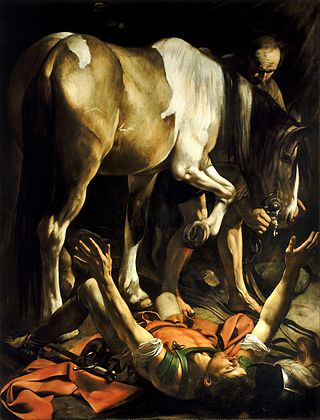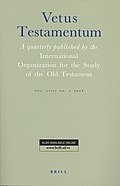
The Bible is a collection of religious texts or scriptures that are held to be sacred in Christianity, Judaism, Samaritanism, and many other religions. The Bible is an anthology – a compilation of texts of a variety of forms – originally written in Hebrew, Aramaic, and Koine Greek. These texts include instructions, stories, poetry, and prophecies, among other genres. The collection of materials that are accepted as part of the Bible by a particular religious tradition or community is called a biblical canon. Believers in the Bible generally consider it to be a product of divine inspiration, but the way they understand what that means and interpret the text can vary.

The New Testament (NT) is the second division of the Christian biblical canon. It discusses the teachings and person of Jesus, as well as events in first-century Christianity. The New Testament's background, the first division of the Christian Bible, is called the Old Testament, which is based primarily upon the Hebrew Bible; together they are regarded as sacred scripture by Christians.
The Old Testament (OT) is the first division of the Christian biblical canon, which is based primarily upon the 24 books of the Hebrew Bible or Tanakh, a collection of ancient religious Hebrew and occasionally Aramaic writings by the Israelites. The second division of Christian Bibles is the New Testament, written in the Koine Greek language.

The Septuagint, sometimes referred to as the Greek Old Testament or The Translation of the Seventy, and often abbreviated as LXX, is the earliest extant Greek translation of the Hebrew Bible from the original Hebrew. The full Greek title derives from the story recorded in the Letter of Aristeas to Philocrates that "the laws of the Jews" were translated into the Greek language at the request of Ptolemy II Philadelphus by seventy-two Jewish translators—six from each of the Twelve Tribes of Israel.

The Hebrew Bible or Tanakh, also known in Hebrew as Miqra, is the canonical collection of Hebrew scriptures, including the Torah, the Nevi'im, and the Ketuvim. Different branches of Judaism and Samaritanism have maintained different versions of the canon, including the 3rd-century Septuagint text used in Second Temple Judaism, the Syriac Peshitta, the Samaritan Pentateuch, the Dead Sea Scrolls, and most recently the 10th-century medieval Masoretic Text compiled by the Masoretes, currently used in Rabbinic Judaism. The terms "Hebrew Bible" or "Hebrew Canon" are frequently confused with the Masoretic Text, however, this is a medieval version and one of several texts considered authoritative by different types of Judaism throughout history. The current edition of the Masoretic Text is mostly in Biblical Hebrew, with a few passages in Biblical Aramaic.

The Minor Prophets or Twelve Prophets, occasionally Book of the Twelve, is a collection of prophetic books, written between about the 8th and 4th centuries BCE, which are in both the Jewish Tanakh and Christian Old Testament.

Marcionism was an early Christian dualistic belief system that originated with the teachings of Marcion of Sinope in Rome around the year 144. Marcion was an early Christian theologian, evangelist, and an important figure in early Christianity. He was the son of a bishop of Sinope in Pontus. About the middle of the 2nd century (140–155) he traveled to Rome, where he joined the Syrian Gnostic Cerdo.

Biblical studies is the academic application of a set of diverse disciplines to the study of the Bible. For its theory and methods, the field draws on disciplines ranging from ancient history, historical criticism, philology, textual criticism, literary criticism, historical backgrounds, mythology, and comparative religion.

The Pauline epistles, also known as Epistles of Paul or Letters of Paul, are the thirteen books of the New Testament attributed to Paul the Apostle, although the authorship of some is in dispute. Among these epistles are some of the earliest extant Christian documents. They provide an insight into the beliefs and controversies of early Christianity. As part of the canon of the New Testament, they are foundational texts for both Christian theology and ethics.

The Codex Alexandrinus, designated by the siglum A or 02, δ 4, is a manuscript of the Greek Bible, written on parchment. Using the study of comparative writing styles (palaeography), it has been dated to the fifth century. It contains the majority of the Greek Old Testament and the Greek New Testament. It is one of the four Great uncial codices. Along with Codex Sinaiticus and Vaticanus, it is one of the earliest and most complete manuscripts of the Bible.

Robert Dick Wilson, PhD, DD was an American linguist and Presbyterian Old Testament scholar who devoted his life to prove the reliability of the Hebrew Bible. In his quest to determine the accuracy of the original manuscripts, Wilson learned 45 languages, including Hebrew, Aramaic, and Greek, as well as all the languages into which the Scriptures had been translated up to 600 AD.
John Barton is a British Anglican priest and biblical scholar. From 1991 to 2014, he was the Oriel and Laing Professor of the Interpretation of Holy Scripture at the University of Oxford and a Fellow of Oriel College. In addition to his academic career, he has been an ordained and serving priest in the Church of England since 1973.
Walter C. Kaiser Jr. is an American Evangelical Old Testament scholar, writer, public speaker, and educator. Kaiser is the Colman M. Mockler distinguished Professor of Old Testament and former President of Gordon-Conwell Theological Seminary in South Hamilton, Massachusetts, retired June 30, 2006. He was succeeded by James Emery White.

Gerhard von Rad was a German academic, Old Testament scholar, Lutheran theologian, exegete, and professor at the University of Heidelberg.

The biblical apocrypha denotes the collection of apocryphal ancient books thought to have been written some time between 200 BC and AD 400. The Roman Catholic, Eastern Orthodox and Oriental Orthodox churches include some or all of the same texts within the body of their version of the Old Testament, terming them deuterocanonical books. Traditional 80-book Protestant Bibles include fourteen books in an intertestamental section between the Old Testament and New Testament called the Apocrypha, deeming these useful for instruction, but non-canonical. To this date, the Apocrypha are "included in the lectionaries of Anglican and Lutheran Churches". Anabaptists use the Luther Bible, which contains the Apocrypha as intertestamental books; Amish wedding ceremonies include "the retelling of the marriage of Tobias and Sarah in the Apocrypha". Moreover, the Revised Common Lectionary, in use by most mainline Protestants including Methodists and Moravians, lists readings from the Apocrypha in the liturgical calendar, although alternate Old Testament scripture lessons are provided.
Kuzhuvelil Varkey Mathew is an Indian biblical scholar and a member of the Society for Biblical Studies in India.
Gregory K. Beale is a biblical scholar, currently a Professor of New Testament and Biblical Theology at Reformed Theological Seminary in Dallas, Texas. He is an ordained minister in the Orthodox Presbyterian Church. He has made a number of contributions to conservative biblical hermeneutics, particularly in the area of the use of the Old Testament in the New Testament and is one of the most influential and prolific active New Testament scholars in the world. He served as the president of the Evangelical Theological Society in 2004. In 2013, he was elected by Westminster Theological Seminary to be the first occupant of the J. Gresham Machen Chair of New Testament. At his inauguration he delivered an address titled The Cognitive Peripheral Vision of Biblical Writers.
John H. Walton is an Old Testament scholar and Professor at Wheaton College. He was a professor at Moody Bible Institute for 20 years. He specializes in the Ancient Near Eastern backgrounds of the Old Testament, especially Genesis and its creation account, as well as interpretation of Job.
A biblical canon is a set of texts which a particular Jewish or Christian religious community regards as part of the Bible.
John Edgar Goldingay is a British Old Testament scholar and translator and Anglican cleric. He is the David Allan Hubbard Professor Emeritus of Old Testament in the School of Theology of Fuller Theological Seminary in California.








